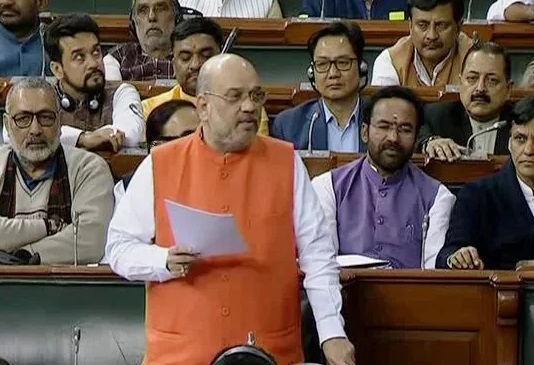J&K STATEHOOD
Date :16-Feb-2021

UNION Home Minister Mr. Amit Shah’s candid statement in the Parliament that Jammu and Kashmir would be given statehood at an appropriate time, demonstrated the Government’s open mind on the issue. If the Kashmir region returns to complete normalcy, the Centre may not mind restoring statehood to Jammu and Kashmir, Mr. Shah stated. However, as he explained the details of the successful moves by the Centre in Kashmir, Mr. Shah indicated that much work needs to be in the region so that it returns to normalcy -- by the standards of the rest of the country, and not by the standards of pre-abrogation period.
This is in nutshell the crux of the Kashmir situation. Recent local-body elections in Kashmir gave a lot of hope and positive feeling to the country that things are improving. Yet, given the manner in which Kashmiri politicians are trying to whip up a separatist sentiment, it is clear to the people that the region will take a fairly long time to return to normalcy as per the national quotient. Until that happens, some measures in the category of abundant precaution will have to be taken so that Kashmir remains peaceful and slowly evolves a socio-political narrative that would defeat the current separatist refrain as promoted by a handful of politicians. The Government cannot lose sight of the fault-lines that are still prominently existing in the Kashmiri socio-political and cultural landscape. The demand to have the Special Status restored to Jammu and Kashmir keeps coming up every now and then. To such people making the demand, Mr.Shah said in Parliament that if the conditions return to complete normalcy, then the Government would be open to return to Jammu and Kashmir its statehood. However, the threat to Kashmir comes mainly from the politicians who have often harboured a separatist agenda for decades.
That is why the Government is willing to wait patiently for Kashmir’s political community to learn the importance of nationally-responsible thought and action so that separatism gets no promotion. Unfortunately, at least the Kashmiri politicians of the separatist category have moral qualms about talking openly that they might rather welcome the Chinese to rule their region. In such a situation, all the Centre can do -- and is doing -- is to wait patiently for the common people of Kashmir realise the benefits of life without Special Status to the region. The very fact that as many as 170 central laws now get applicable to Kashmir along with the rest of the country, should be enough to communicate a sense of well being in the heads and hearts of the Kashmiri people. The common people in Kashmir’s streets should also realise that the region is no longer giving the impression that it a military camp -- with streets guarded heavily by the Armed Forces. There is a remarkable and marked change on this count.
There is also a tremendous reduction of terror-incidents as well as stone-pelting mainly by misguided youngsters. All those ominous signs of social, political, cultural and administrative decay have almost fully vanished from the Kashmir scene. No matter what the Political Opposition might say about the Kashmiri Pandit community still on its own scattered all over. But such complaints have little value as visible efforts by the Centre to create conditions favourable to the return of the displaced members of the Pandit community have already created a sense of assurance, hope, that in due course of time, the Pandit community in Kashmir will have all its members happily ensconced in their own homes in Kashmir. Of course, it is expecting too much for the ills that dogged Kashmir for seventy years would vanish in a moment. Much work will have to be done for return of normalcy by national standard to Kashmir. One thing is sure -- that the Centre’s positivism is rubbing off well on the average Indian people including the ones in Jammu and Kashmir.